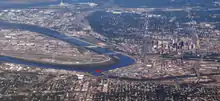Kaw Point
Kaw Point is the name given to the point where the Kansas River (aka Kaw River) terminates at the Missouri River in the West Bottoms area of Kansas City, Kansas. Kaw Point is also where the Missouri ceases its southerly course and turns to flow generally east through the state of Missouri to the Mississippi River at St. Louis.


History
Kaw Point, located in Kansas City, Kansas was part of the land originally claimed by Spain, then by France, until ultimately the United States bought it as part of the Louisiana Purchase in 1803. The Lewis and Clark expedition party camped at Kaw Point June 26[1][2]–28, 1804, on their way from St. Louis to the Pacific Ocean.
Captain William Clark wrote on June 27, 1804, that "the Countrey [sic] about the mouth of this river is verry [sic] fine."[1] The expedition's journals also noted that the location would be appropriate for a fort, and that the area teemed with deer, elk, buffalo, bear, and many "Parrot queets", the now extinct Carolina parakeet. It is the original reason for the location of the Kansas City Metropolitan Area. Lewis also observed that the water in the Missouri was muddier than the water from the Kaw.[2]
At 94 degrees 36 minutes west longitude, Kaw Point was the basis for the state of Missouri's western border from Iowa to Arkansas when it became a state in 1821. (Kansas entered the Union in 1861.) South of the Missouri River, that longitude still forms the border between Kansas and Missouri. North of the Missouri River, the state of Missouri extended its boundary farther to the west in 1836 with the Platte Purchase.
Kaw Point became part of Kansas Territory in 1854 when the United States Congress passed the Kansas-Nebraska Act, which opened the area for white settlement. In 1859 the city of Wyandotte, which included Kaw Point, was incorporated. Kaw Point became part of Kansas City, Kansas as part of the consolidation of 1886.
Today, the point is the site of Kaw Point Riverfront Park.
References
- 1965-, Hillstrom, Laurie Collier (2016). The Lewis and Clark Expedition. Detroit, MI. p. 38. ISBN 9780780814172. OCLC 910987428.CS1 maint: numeric names: authors list (link)
- Elin., Woodger (2004). Encyclopedia of the Lewis and Clark Expedition. Toropov, Brandon. New York: Facts On File. p. 193. ISBN 0816047812. OCLC 51900390.
External links
| Wikimedia Commons has media related to Kaw Point. |